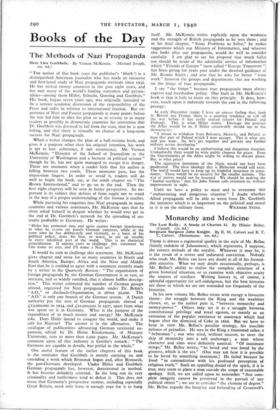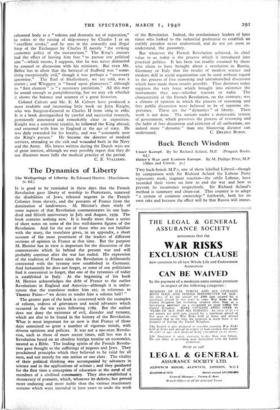Monarchy and Medicine
The Last Rally : A Study of Charles II. By Hilaire Bellod. (Cassell. I2S. 6d.) Sergeant Surgeon John Knight. By E. M. Calvert and R. T. C. Calvert. (Heinemann. los. 6d.) THERE is always a regimental quality in the style of Mr. Belloc (faintly redolent of Johnsonese), which represents, I suppose,
the correct attitude of the royalist. Whatever it may be, it is the result of a severe and indurated conviction. Nobody who reads Mr. Belloc can have any doubt at all of his formid- able sincerity. What we may doubt occasionally, perhaps, is Mr. Belloc's ability to realise the complete structure of a given historical situation, or to examine with objective acuity the sources of conduct. Writing history is, of course, a splendid opportunity for self-indulgence, but the best histories are those in which we are not reminded too frequently of the historian.
In his new volume Mr. Belloc treats with energy a favourite theme: the struggle between the King and the wealthier classes, or, as the author puts it, " between monarchy and money-power." Others may see it as a struggle between constitutional privilege and royal egoism, or merely as an extension of the popular resistance to autocracy which had begun after the dismissal of Coke in 1616. But we have to keep in view Mr. Belloc's peculiar strategy, his irascible defence of prejudice. He sees in the King a frustrated sailor, a " helmsman " ; one who tried, without success, to steer the ship of monarchy into a safe anchorage ; a man whose character and aims were definitely nautical. " Of inanimate things," Mr. Belloc writes, " he loved and was loved by the greatest, which is the sea." (One may ask how it is possible to be loved by something inanimate.) He failed because he lived " in contradiction with his profound perception of religious truth." Such an appalling denial of the spirit, if it is
true, may seem to place a man outside the scope of reasonable apology. Still, we are called-upon to remember "that com-
plete integrity cannot be preserved in the pursuit of any political object " ; we are to consider " the element of degree." Mr. Belloc regards the hanging and beheading of Cromwell's exhumed body as a " solemn and dramatic act of reparation," he refers to the raising of ship-money by Charles I as an " excellent stroke," and he sees in the cowardly and illegal Stop of the Exchequer by Charles II merely " the striking economic policy of the moratorium." The King's amours had the effect of leaving him free " to pursue one political aim "—which means, I suppose, that he was never distracted by counsel or discussion with his ministers. But even Mr. Belloc has to allow that the betrayal of Stafford was " some- thing exceptionally evil," though it was perhaps a " necessary ignominy." The Earl of Shaftesbury, we are told, was a traitor ; and Whiggery is " based upon plutocracy," although its " first element " is " a necessary patriotism." All this may be sound enough as pamphleteering, but we may ask whether it shows the balance and acumen of a great historian.
Colonel Calvert and Mr. E. M. Calvert have produced a most readable and interesting little book on John Knight, who was Surgeon-General to Charles II from 1664 to 1680. It is a book distinguished by careful and successful research, pertinently annotated and remarkably clear in exposition. Knight was a consistent royalist, he followed the King abroad, and returned with him to England at the age of sixty. He was duly rewarded for his loyalty, and was " constantly near the King's person." He became the director of medical services, attending to the sick and wounded both in the Navy and the Army. His letters written during the Dutch wars are of great interest, although we may possibly regret that they do not illustrate more fully the medical practice of the period.
C. E. VULLIAMY.















































 Previous page
Previous page